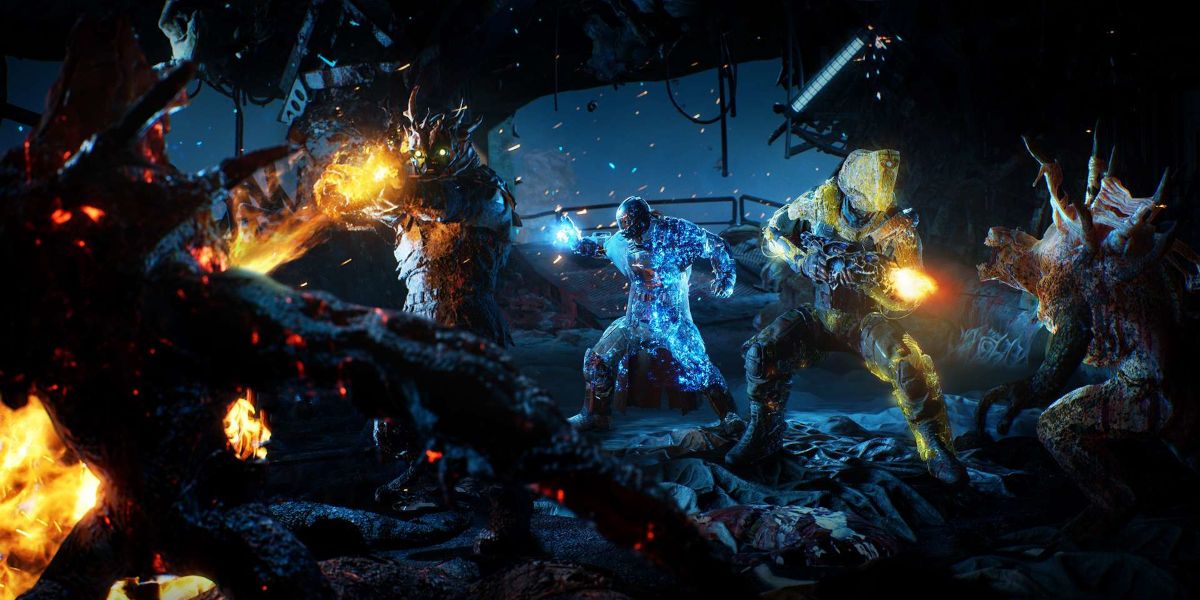Outriders, the new RPG-shooter from People Can Fly and Square Enix, has been out in the world for just about two weeks now. Millions of players have traveled to the gorgeous and perilous alien world of Enoch to venture out beyond the colony border and explore the planet's mysteries. But back here on Earth, shiny new games are vying for players' attention every week if not every day. Can Outriders' approach of delivering all the content they had to offer in the box, Day One, keep the game going long enough to establish itself as a success? Or will the teams behind the scenes need to deliver a roadmap, at the very least, to keep players from jumping ship? Should they embrace the 21st century state of the gaming industry and turn Outriders into a live-service game?
Lots of questions there, but before we answer them (or attempt to), it's worth keeping in mind that People Can Fly and Square Enix might already count Outriders as a success. That metric depends on just what they wanted out of the game's rollout. If they were aiming for decent sales numbers and a sizable player base right out of the gate, this and nothing more down the road, they could argue in favor of calling Outriders a success. And since they were rather vocal about not marketing the game as a looter-shooter or a games-as-a-service title, on the surface, it seems as if they should be happy with early numbers, happy enough to walk away completely and let the game stand on its own.
But there are a couple of things complicating that approach: The fact that even solo single-player campaigns can't be enjoyed offline and that the hard-working team behind the scenes has been toiling around the clock to make sure the Outriders experience is the best it can be for the most people possible. That ... sounds like a live-service game to me.
Sure, if you launch a game in 2021 and beyond, especially a game with required online components, you're basically expected to support it for as long as it's viable. This fact in and of itself doesn't mean that Square Enix and People Can Fly plan to do this in the long run. However, if you're going to put all that effort into maintaining a game with live service fixes ... you might as well run it as a live-service game. They're already doing this, just without the benefits of new content roadmaps, potentially lucrative microtransactions, and a healthy marketplace. They're basically doing the work of a live-service game without the upside. And with the Outriders player base expected to dwindle rather than grow the further we get from the release date, that pain point is also going to grow ... unless they switch to a GaaS approach.
Currently, and as of this writing specifically, Outriders Steam players peaked at a little over 72,000 in the last 24 hours, good enough for 15th place overall. The game's concurrent players on Steam put it in the company of similar games like Destiny 2 and Warframe but well behind the platform's Top 5 titles like CS:GO, Dota 2, GTA V, Apex Legends, and PUBG. Other titles, many of which have been out for significantly longer than Outriders' two weeks, continue to enjoy a healthy player base, like Valheim, Rust, and Team Fortress 2 (though that latter game has a serious bot problem.)
Those two weeks' worth of Steam data for Outriders is also good enough to give us a working daily average (~71k) and a peak player base (~125k). As a point of comparison, Destiny 2, which has been out for three-and-a-half years now, has averaged ~72k daily players since the fall of 2019. That average has obviously gone up and down over the last year-and-a-half, though the title peaked at more than 292k, easily more than doubling Outriders' debut peak. When did that peak hit? October 2019, paired to the re-release of Destiny 2 as the free-to-play live-service model.
Bungie doubled down on the surge in interest by also releasing the title on next-gen consoles Xbox Series X|S and PS5, and cloud-gaming platform Google Stadia. And while the Destiny 2 community experiences surges in popularity timed to new expansions, updates, seasonal events, annual passes, and more, the players keep coming back because the content keeps flowing. Not so for Outriders; at least, not yet. The People Can Fly game could opt to go that direction if they chose to do so, if they hope to give Outriders numbers like Destiny 2 or even better over the next two years.
The other half of a game's metrics these days is viewership over live-streaming platforms like Twitch, YouTube, and Facebook Gaming. Once upon a time, hard sales numbers were all that mattered, and positive buzz was a cherry on top of a game's performance and a feather in the cap for the marketing teams. Now, live-streaming audiences absolutely have to be part of the plan from conception to rollout and for the life of the game until the inevitable sequel, should the title prove successful.
On Twitch, Outriders peaked on launch day, unsurprisingly, and has since settled to around the 20th most popular game/category on the platform. The biggest viewer numbers are still inflated somewhat by Twitch's most popular streamers giving Outriders a temporary spotlight before returning to their variety schedule or their tried-and-true games; the streamers maining Outriders now, only two weeks later, are those hoping to further build their channel and community on the back of the game and those who truly love it, with a good amount of crossover between the two. I'm thrilled that Outriders currently has a dedicated community, but the only way to grow both the player base and the viewer base is to feed new content into the game in the months ahead. And that's not the intention of People Can Fly.
Last year, Outriders creative director Bartosz Kmita told IGN:
“When we started our game and realized that the story is so important, we realized if we did a game-as-a-service, we would probably start chopping everything into sub-content. We didn’t want to do this because the story was so important for us. We think that there are a lot of cool games on the market, and people maybe don’t have any more time to spend 300 hours to basically grind one item.”
This was, of course, the line of thought before the COVID pandemic. The release of the demo alone showed that, yes, people had more free time than before and that, yes, a certain subset were more than happy to grind the same few events over and over for Legendary loot. That fact alone should have caused People Can Fly to take notice and at least consider cooking up more content for post-launch pipelines. Maybe they did. Maybe they're waiting until they get their current experience-souring bugs fixed before returning to the content pool. I truly hope they are, because the Outriders story, while not ground-breaking, is a thrilling new original IP that PCF should be proud of.
This base game feels like an origin story, a beginning, a first chapter in a potentially huge franchise that could see the title character pushing further into Enoch and possibly beyond. But much like the potential of fellow titles Anthem and Marvel's Avengers, it can easily be squandered by a few poor decisions.
To cut Outriders off at the knees after all the hard work the teams and the players have put into it would be such a waste. There's massive upside here, but it would require a roadmap of new content, seasonal events, DLCs and expansions, and ultimately, sequels that would continue to build upon the solid foundation of a story. There are plenty of examples in the video game industry of how to do this rollout right ... or how to epically botch it. As a fan of this game, as someone who wants to see more from its world, I sincerely hope PCF considers their approach to Outriders and opts to go for a franchise rather than a one-shot. The ultimate success of their standalone game might just depend upon it.




